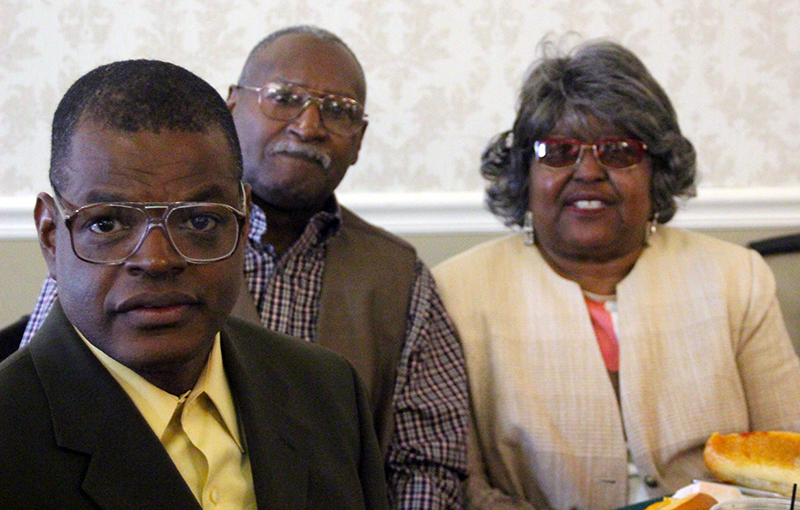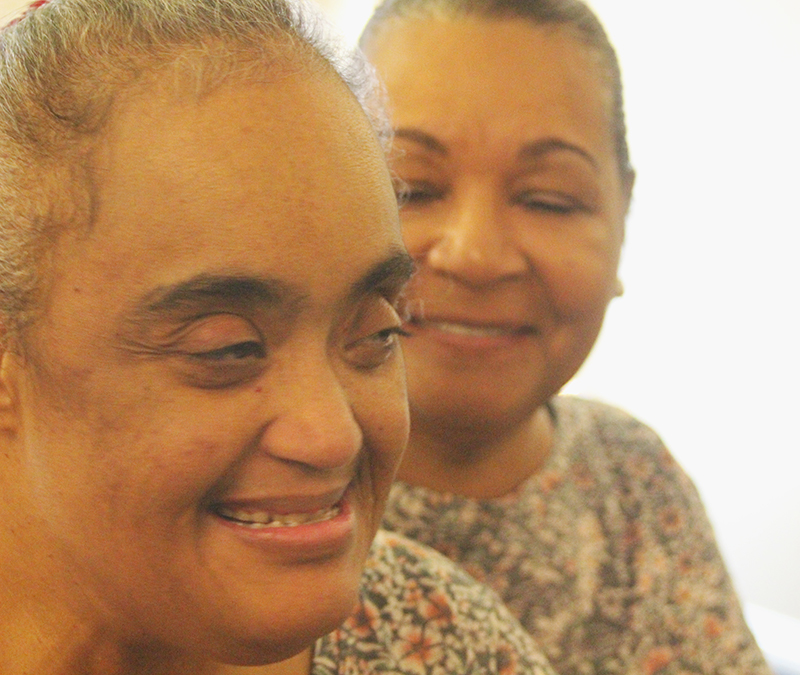
Rotan Charleston (left) has lived with Herman and Janie Corbett for 32 years as part of an archdiocesan program that matches families and adults with intellectual disabilities. (Photo by Gina Christian)
Two weeks before his 53rd birthday, Rotan Charleston celebrated the Christmas season at a catered luncheon with his family members — more than 250 of them.
The Dec. 8 gathering at Essington’s Lazaretto Ballroom has become an annual tradition for the Life Sharing through Family Living program, which places adults with intellectual disabilities into stable, loving homes.
An outreach of archdiocesan Catholic Social Services (CSS), the life sharing network was launched in 1987. The program is part of CSS’s Communities of Don Guanella and Divine Providence, which provide a broad continuum of care to men and women with intellectual and developmental disabilities.
[hotblock]
At present, 69 individuals and 62 families participate in the life sharing program — and they think of themselves not as clients, but a community.
“Everyone in this room is connected,” said Telisha Feamster, a CSS administrator of community-based programs. “They help each other out. You can see the natural relationships that these folks have with each other.”
For Janie and Herman Corbett, with whom Charleston has lived for 32 years, life sharing is about more than simply offering a spare bedroom to someone in need.
“He’s our son,” said Janie. “He’s family. We care about him.”
The stability of family
Feamster, herself a life sharing provider, said that the Corbetts are typical of the program’s participating families, several of whom have been involved for 20 to 30 years. Such long-term stability is one of the advantages of the arrangement.
“You have a family who is truly invested in your well-being,” said Feamster. “At a group home, it can be hard for residents when staff find another job. But with a family, even when loved ones grow up and move on, they still stay in touch.”
[tower]
Families and individuals are matched through what program director Teri Johnson calls a “dating process” that begins with short visits and extended stays to assess compatibility.
Individuals with qualifying Medicaid waivers are referred to the life sharing program – which is regulated by the Pennsylvania Department of Human Services – through their county’s mental health department. After reviewing the person’s information, the program staff consider which families (many of whom sign up through word of mouth) would be a possible fit.
Life sharing homes must meet certain requirements for cleanliness and, if needed, handicapped accessibility. All family members residing in the home are required to undergo a medical examination and to satisfy both state and federal background checks.
Each year, the families must complete 24 hours of training that includes instruction in CPR, first aid, fire safety and family dynamics.

Geneva Harris (right) has lived with Sheila McLeod for 34 years as part of an archdiocesan program that matches families and adults with intellectual disabilities. (Photo by Gina Christian)
The program is funded by the mental health department of each individual’s county, which pays a daily rate that CSS forwards to the life sharing family. The individual is then responsible for room and board, which amounts to 72 percent of his or her Social Security benefit.
Once individuals are matched with a home, CSS works to “support the whole family,” said Feamster.
Each family is assigned a case worker who calls weekly and visits in person at least once a month. The CSS life sharing team meets regularly to monitor each family’s status, offering “a lot of checks and balances” to ensure the arrangements work out, said Johnson.
When considering participants, the CSS team also uses common sense and intuition.
“We follow our guts,” Johnson said. “Sometimes people will come through with an excellent application, but when we’re talking to them, we sense it might not be a successful fit, or that the family isn’t doing it for the right reason.”
Aging out and falling through the cracks
Such vigilance enables the CSS Life Sharing team to help prevent young adults with intellectual disabilities from “falling off the cliff” – aging out of their childhood benefits when they turn 21 or 22, and facing what University of Michigan law professor Samuel Bagenstos calls “an underfunded and uncoordinated system” of agencies and providers.
According to the Centers for Disease Control, “about one in six children in the U.S. have one or more developmental disabilities or other developmental delays.”
Feamster said that Philadelphia County in particular has begun working with CSS “up to 18 months ahead of the age-out point” for a number of its referrals.
[hotblock2]
Johnson added that her team also “helps pick up those who fall through the cracks” when they transition to adulthood.
In cases where a life sharing parent becomes ill or dies, Johnson said, “the adult children have often taken over, so the individual stays with the family.”
The whole family grows
Life sharing families are quick to note that while they enjoy helping someone in need, the individual enriches their lives as well.
“She has taken us wonderful places,” said Sheila McLeod of Geneva Harris, with whom she has lived for 34 years. “She’s helped the whole family grow.”
Violane Gillyard, who has shared her home with Sharon Jones for the past 33 years, agrees.
“She’s like my daughter, through thick and thin,” said Gillyard. “I learn from her, just like she learns from me. She’s been there with me, and I love her.”
As the nation’s overall population continues to age — and as policy shifts away from congregate living options for those with intellectual disabilities — the life sharing model is set to increase.
“There is a large push within Pennsylvania to offer this residential option as opposed to others, given the continuity of care and the cost efficiency,” said Johnson. “Life sharing is the program of the future.”
PREVIOUS: Meet the millennial Catholics of Phila. sticking with their faith
NEXT: Discern how to avoid a post-Christmas present: credit debt


Share this story